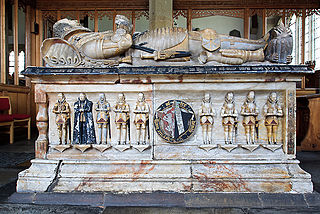Related Research Articles

Baron Ashburton, of Ashburton in the County of Devon, is a title that has been created twice, once in the Peerage of Great Britain and once in the Peerage of the United Kingdom. Since 1835, the title has been held by members of the Baring family.

There have been three baronetcies created for persons with the surname Croft, one in the Baronetage of England and two in the Baronetage of the United Kingdom. All three creations are extant as of 2008.

The HaringtonBaronetcy, of Ridlington in the county of Rutland, is a title in the Baronetage of England. It was created on 29 June 1611 for James Harington. He was a descendant of John Harington, one of the Barons summoned to Parliament by Edward II. James's elder brother was John Harington, 1st Baron Harington of Exton. The second Baronet was a Royalist during the English Civil War. The third Baronet was a Major-General in the Parliamentarian Army and one of the judges appointed to try Charles I, although he refused to sit. He was nonetheless excepted from the Indemnity and Oblivion Act and his title was forfeited for life in 1661. The ninth and twelfth Baronets were both judges.

There have been ten baronetcies created for persons with the surname Browne, six in the Baronetage of Great Britain, three in the Baronetage of Ireland and one in the Baronetage of Nova Scotia. Only one creation is extant as of 2010. Three of the creations were for members of the Browne family headed by the Viscount Montagu.
Nineteen baronetcies have been created for persons with the surname Hamilton, eight in the Baronetage of Nova Scotia, one in the Baronetage of England, five in the Baronetage of Ireland, one in the Baronetage of Great Britain and four in the Baronetage of the United Kingdom. As of 2008 two creations are extant, two are dormant, two are either extinct or dormant and twelve extinct.

There have been seven baronetcies created for persons with the surname Parker, three in the Baronetage of England, two in the Baronetage of Great Britain and two in the Baronetage of the United Kingdom. Two of the creations are extant as of 2008. Though none of the different families of baronets were related, several supplied a number of flag officers to the Royal Navy.
There have been nine baronetcies created for persons with the surname Lloyd, three in the Baronetage of England, three in the Baronetage of Great Britain and three in the Baronetage of the United Kingdom. Two of the creations are extant as of 2010.
The Cave, later Cave-Browne, later Cave-Browne-Cave Baronetcy, of Stanford in the County of Northampton, is a title in the Baronetage of England.
There have been eight baronetcies created for persons with the surname Graham, two in the Baronetage of Nova Scotia, two in the Baronetage of England, one in the Baronetage of Great Britain and three in the Baronetage of the United Kingdom.
There have been three baronetcies created for persons with the surname Everard, one in the Baronetage of Ireland, one in the Baronetage of England and one in the Baronetage of the United Kingdom. Only one creation is extant as of 2010.

The Worsley family is an English family that is derived from Sir Elias de Workesley, a Norman knight who was a youth at the time of the Norman conquest. He later accompanied Duke Robert II of Normandy on the First Crusade and was buried at Rhodes.

There have been two baronetcies created for members of the Salusbury family, the first in the Baronetage of England and the second in the Baronetage of Great Britain. Neither title has survived to the present day although the senior baronetcy is technically considered to be dormant.
There have been four baronetcies created for persons with the surname Musgrave, one in the Baronetage of England, one in the Baronetage of Nova Scotia, one in the Baronetage of Ireland and one in the Baronetage of the United Kingdom. As of 2014 two of the creations are extant.
Peregrine Hoby, was an English landowner and member of parliament who sat in the House of Commons at various times between 1640 and 1679.
The Pollen Baronetcy of Redenham, in the County of Southampton, is a title in the Baronetage of Great Britain. It was created on 15 May 1795 for John Pollen. The family descended from Edward Pollen, a London merchant originally from Lincolnshire.

There have been six baronetcies created for members of the Corbet family, four in the Baronetage of England, one in the Baronetage of Great Britain and one in the Baronetage of the United Kingdom. All creations are extinct. The recipients were descendants of the ancient Norman family of Corbet which held substantial estates in Shropshire including Wattlesborough, Caus Castle, Moreton Corbet Castle and Acton Reynald Hall.
Anne Hoby was an English heiress.
The Hoby Baronetcy, of Bisham in the County of Berkshire, was a title in the Baronetage of England. It was created on 12 July 1666 for Edward Hoby, the son of Peregrine Hoby (1602–1679), during his father's lifetime.
There are four extinct baronetcies created for persons with the surname Norton: two in the Baronetage of England, one in the Baronetage of Ireland and one in the Baronetage of Nova Scotia.
Thomas Hoby JP DL of Bisham Abbey, Berkshire and Breamore, Hampshire, was an English politician.